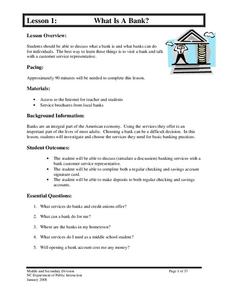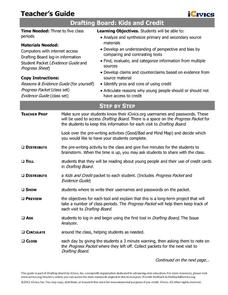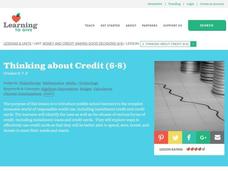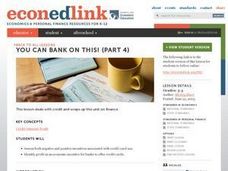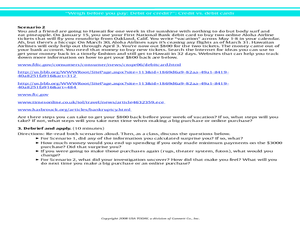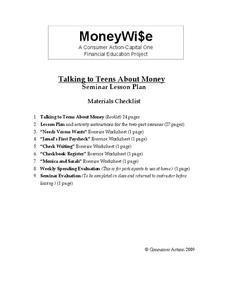Curated OER
Who Controls the Real Cost of Credit Cards?
Students view the film "How Much Does Debt Cost?" and explore the reasons why credit card fees and interest rates have gone up so much over the last 25 years. They participate in class discussion and complete a worksheet.
Federal Reserve Bank
Keep the Currency
Each day, people throw currency away in different ways because of a lack of financial knowledge. Introduce your learners to the importance of financial literacy and assess their understanding of banking and personal finance.
Curated OER
How You Use Credit Cards Should Determine How You Choose Them
Students explore the concept of credit cards. In this credit cards lesson, students read an article about credit card spending. Students discuss different ways in which people use credit cards. Students determine what kind of spender...
North Carolina Department of Public Instruction
What Is A Bank?
You're never too young to learn about banking and personal finance. Use a set of seven banking lessons to teach middle schoolers about checking and savings accounts, interest rates, loans and credit cards, and safety deposit boxes.
Practical Money Skills
Using Banking Services
Using a bank is a privilege and a responsibility for young consumers. Teach them the important terms and details about creating accounts, using an ATM, and maintaining a credit card.
Wells Fargo
Hands on Banking
Encourage middle schoolers to be proficient and knowledgeable in the economic world with a series of personal finance lessons. Focusing on banking, credit, budgets, and investing, the activities guide learners through financial literacy...
Kiwi Crate
Shopping on a Budget
Print some money with a resource on dollars and cents. Combined with a lesson plan about budgeting, the currency includes $1, $5, and $10 bills, coins of varying value, and a platinum credit card.
Curated OER
Credit - Good? Bad?
Students examine credit cards. They explore the detrimental effects that result from debt and poor credit. Students analyze interest rates, minimum balances, and consumer debt. Students survey the benefits of credit cards.
Federal Reserve Bank
It's Your Paycheck
Beyond reading and arithmetic, one of the most important skills for graduating seniors to have is fiscal literacy and responsibility. Start them on the right financial track with nine lessons that focus on a variety of important personal...
iCivics
Drafting Board: Kids and Credit
Should kids under the age of 18 be given access to credit cards? Learners identify pros and cons of using credit, develop claims based on evidence, and finally argue reasons for or against credit for minors.
Visa
The Danger of Debt: Avoiding Financial Pitfalls
How can our perspectives of borrowing and returning influence the way we view credit? Pupils explore the concept of debt, how it impacts our ability to obtain credit, and finally the ways in which we can work to alleviate debt.
Curated OER
Filling Empty Pockets: Borrowing, Loans, and Credit
Students examine credit components and how each works within our economy today. For this financial literacy lesson, students explore credit terms and make decisions based on real credit card offers that they find in their on line research.
Curated OER
Thinking About Credit
Middle schoolers explore the concept of credit. In this credit lesson, students discuss what it means to buy items using credit. Middle schoolers discuss how interest accrues and how much is really being paid with a credit card. Students...
Visa
Keeping Score: Why Credit Matters
How does one get credit, and who provides credit? What is a credit score, and how can an understanding of a credit score help you to make smart financial decisions? Through discussion and worksheets, class members will identify the...
Curated OER
Thinking About Credit
Students examine the use of credit such as installment purchases and credit cards. In this credit lesson, students learn the vocabulary associated with credit usage such as mortgage, credit report/score, and debit cards. They determine...
Council for Economic Education
You Can BANK on This! (Part 4)
Students assess both negative and positive incentives associated with credit card use. They identify profit as an economic incentive for banks to offer credit cards.
Curated OER
Pay Credit When Credit is Due
Students explore the concept of credit. In this credit lesson, students examine student organizers that focus on credit scores and credit history. Students participate in an on-line activity. Students examine credit card offers and...
Curated OER
Credit: Taking an Interest in Credit
Students examine how credit works but looking at how credit cards and interest rates work. They use percentages to solve problems using credit card interest rates while completing a worksheets.
Curated OER
Weigh Before You Pay: Debit or Credit?
Students explore the concept of debit and credit cards. In this debit and credit card lesson, students read an article about debit and credit cards. Students discuss differences between the two forms of payment. Students calculate the...
Curated OER
Charge!?
High schoolers compare/contrast the features of three different types of credit cards. They discuss the pros and cons of credit cards, answer discussion questions, and complete a worksheet evaluating three credit cards.
Conneticut Department of Education
Personal Finance Project Resource Book
Balancing a budget, paying taxes, and buying a home may feel out of reach for your high schoolers, but in their adult years they will thank you for the early tips. A set of five lessons integrates applicable money math activities with...
Wells Fargo
Hands on Banking
Cha-ching! You just hit the jackpot with this interactive consumer math unit. Supported by a series of online lessons and activities, these lessons engage students in applying their math skills to real-life personal finance problems...
Consumer Action
Talking to Teens About Money
Your teenagers are probably very good at spending money, but how good are they at managing it? Teach class members about banking, checking accounts, interest rates, car insurance, and many other relevant concepts with a series of...
Curated OER
Credit Cards and Compound Interests-Exponential Growth
Eleventh graders investigate the way credit cards work when collecting interest. In this algebra lesson, 11th graders investigate the growth of interest exponentially when using a credit card. They calculate what the cheapest rate is to...





